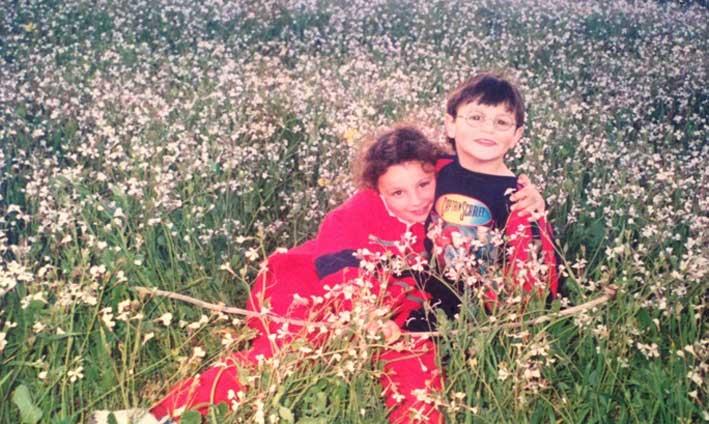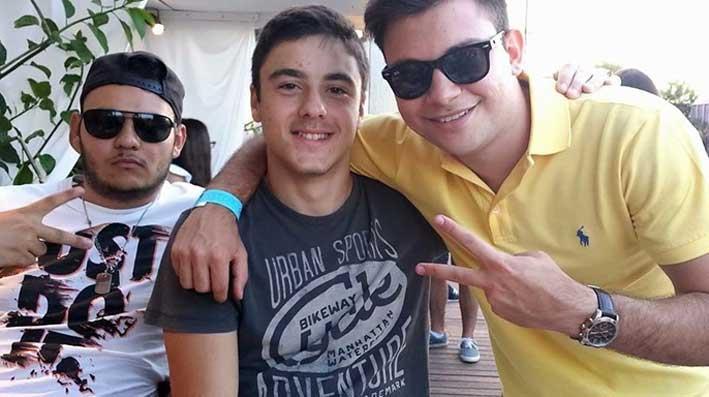As the sun rose on an otherwise ordinary summer's day last June, the beautiful soul of 20 year old Drew Abela departed from his body and soared above the mundane and the ordinary, to enter the realm of kings and legends. Kenneth and Sharon’s worst fears, the unexpected death of a son, had just materialized. It was during this difficult moment that they were reminded of - immediately acknowledged - their son’s altruistic and selfless character. Some time before his death, they had discussed as a family the idea of organ donation. And now it was time to do it.
Drew’s gentle and kind character now lives on in seven ‘strangers’, who would now be able to get a glimpse, a touch, a heartbeat even, of Drew’s nature, and be lucky enough to feel his wittiness, kindness, patience, good nature and generosity. They would also be able to get a glimpse of his altruism and love for others in any shape or form, and above all faith in God, the way that his parents and loving sister Bobbie, family and friends, have been lucky enough to touch and feel in his short yet beautiful and meaningful life.
In this interview with Helena Grech, Kenneth and Sharon give an account of their experience and encourage others to follow suit.

Drew (right) with his parents Kenneth and Sharon, sister Bobbie (right)
1. How did you come to the decision to donate your son’s organs? Were you approached by a medical professional or did you decide on your own?
Sharon: “I literally screamed out the decision as soon as the doctors indicated that there was no hope for him. I think that, at that moment, donating his organs gave me a feeling of the possibility of continuity. In addition, I felt this overwhelming feeling of 'I will not let anything worth saving of my son's life go to waste'.
Kenneth: "I immediately agreed with Sharon’s idea, especially since we had been aware that Drew had wanted to do this.”

Drew with his sister Bobbie (above) and (below) when they were young children
2. Did it take you a long time to take the decision? Is there some form of timeframe where you could carry out the harvesting process, otherwise it would be too late?
Sharon: “Not at all, I may have jumped the gun actually. I mentioned it before they did if I am not mistaken. I am not sure that had it not been the case, they would have given us a timeframe to decide.”
Kenneth: “I believe that there is a very short time in which one can take such a decision because there is a whole process of matching the organs to their prospective recipients, which also takes time. As Sharon said the decision was taken by us very quickly and this was also based on the fact that Drew had wanted to do this.”

3. How did you decide which organs to donate? Were you given particular advice based on medical reasons, or was it more of an emotional decision?
Sharon and Kenneth: “It was instant and as said above it was primarily an emotional decision. We had talked about this with both our son and daughter and we were all of the same opinion. We wanted to donate everything possible; we did not give any reservations.
4. What was the process like?
Sharon: “For me it was very traumatic. It is probably not anyone's fault but the process needs to be better thought out and executed, especially when it is sudden like ours was. There is too little time between when your loved one is alive and then he is simply a 'supply for parts'.”
Kenneth: “I felt that the person involved was very careful in his request. Yes, he had to be a bit clinical; however he exercised a high amount of caution, even though there was a very short span of time when this had to be decided.”

In photos above and below, Drew with relatives and friends
5. Could you describe your feelings when the organ harvesting was carried out?
Sharon: “There was too little time to digest the whole thing, so again, it felt traumatic. We were there before they took Drew to the theatre and after he was returned, at which point he did not look the same as he was before, and this upset me. For me he was still my baby. There needs to be some professional who guides the relatives throughout this process. Possibly even a threshold of time when the relatives leave the hospital before the tests begin. Also a suggestion is that relatives should be assured that the removal of the organs is done with the best loving hands possible and under the best conditions, reassuring the grieving parents that the donor is treated in the best humanely and respected way for his honourable gesture as much as possible.”
Kenneth: “I had personally advised my wife that we should not go back to see our son after the harvesting was complete. She had insisted that we should go back to see him after this (harvesting the organs) had been completed; however in hindsight we should have not gone. From their end they were very sensitive to allow our request to be granted so we don’t blame anyone for letting us in. We are here dealing with a very difficult thing and nothing can be done to improve how they reacted.”

6. Would you encourage anybody else in your situation to donate a deceased family member’s organs?
Sharon and Kenneth: “Definitely, in fact I/we would like to create an organisation or campaign in Drew's name to create awareness towards organ donation. This, however, will be accompanied by a guarantee that proper support is given during the process.”
7. Are you aware of where the organs were donated?
Sharon: “Friends have told us that a number of people approached them that they knew who had received the organs. In Malta, everyone knows everyone. I would like to meet the receivers in Malta, especially the person who received the heart as soon as he/she is out of danger.”
Kenneth: “Although nothing would give me greater pleasure than meeting them and embracing them, I personally would not like to instigate the ‘search’ myself. I want to respect the recipient’s own wishes, and sincerely hope that they would want to seek us out.”

8. What did you find the most difficult out of the entire process?
Sharon: “There were some issues with knowing when our son would be released for burial after the removal of the organs due to logistics, and there was an issue with the death certificate which was 'lost in transit' due to miscommunication between the different administrative blocks. This is said in the light that we needed to make the necessary funeral arrangements, and family and friends needed to know the details and we could not give them out. Better coordination of the process would make things less stressful.”
Kenneth: “We are not sure who was responsible for this lack of coordination, but having to call a number of people to see where the certificate was, was the last thing on our mind. Without this certificate the hospital does not release the body.”

9. Did the decision to donate your son’s organs give you any form of closure? Did it help with the grieving process, knowing that your son helped the lives of others?
Sharon: “Definitely! The fact that he saved or helped the quality of life of seven people is very comforting and this act of altruism has helped us come to terms with the loss. Ironically, the fact that his heart is still beating is very comforting, it gives us a sense of continuation of life rather than closure.
Kenneth: “Undoubtedly, and especially when we were told that the person accepting the heart had been waiting for five years, we immediately wanted to see what can be done to create and increase the awareness, with a simple “share” on Facebook of a previous The Malta Independent article being the first thing that we immediately did.
10. What would you tell any other parents in your situation, should they be facing a similar decision?
Sharon: “Go for it but brace yourselves as it is one of the most difficult decisions a parent could ever make and at the same time it is the ultimate act of kindness and selflessness which in itself helps to ease the pain derived from the loss of a child.”
Kenneth: “Signing the authorisation form was the worst and most difficult, but simultaneously undoubtedly the best signature of my life.”